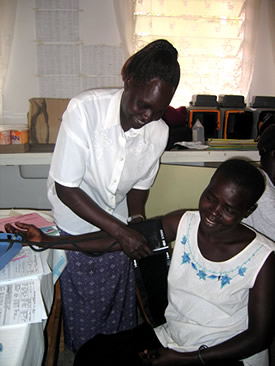A straightforward intervention called intermittent preventive treatment for pregnant women (IPTp) can reduce the adverse effects associated with malaria in pregnancy and increase the chances of a healthier mother and baby.
Malaria infection during pregnancy poses a serious health risk to both the mother and her unborn child. In Africa, malaria in pregnancy is estimated to cause up to 200,000 infant deaths annually. A straightforward intervention called intermittent preventive treatment for pregnant women (IPTp) can reduce the adverse effects associated with malaria in pregnancy and increase the chances of a healthier mother and baby. The World Health Organization currently recommends that pregnant women take at least two doses of IPTp with the antimalarial drug sulfadoxine-pyrimethamine after quickening, i.e., when the baby first moves inside the mother. The doses should be taken at least one month apart and are provided during routine antenatal care visits. IPTp is usually administered during routine antenatal care visits under direct observation of health workers.
In sub-Saharan Africa, most women visit an antenatal clinic at least once during pregnancy, and in many countries, women visit an antenatal clinic several times, providing sufficient opportunity to provide IPTp. Despite this fact, in most countries, the percentage of pregnant women who receive at least two treatment doses of IPTp is well below the Roll Back Malaria target of 80 percent (IPTp coverage targets for the President’s Malaria Initiative [PMI] are 85 percent).
In Kenya, IPTp was adopted and implemented in 1998. However, the 2003 Kenya Demographic and Health Survey (KDHS) showed only 4 percent of recently pregnant women received two doses of IPTp. This low IPTp coverage was surprising since, in Kenya, the vast majority of women visit an antenatal clinic at least twice during pregnancy, typically beginning in their second trimester of pregnancy. A primary reason identified for the missed opportunities to provide at least two doses of IPTp is health worker confusion over when to give pregnant women IPTp.
The Ministry of Health (MOH) attempted to increase IPTp coverage by simplifying the IPTp policy in 2006 to state that women should be given IPTp at every antenatal clinic visit after quickening, provided there is an interval of four weeks between doses. Despite this effort, a Kenya Malaria Indicator Survey (KMIS) conducted in 2007 showed only 13 percent of recently pregnant women received two doses of IPTp.

